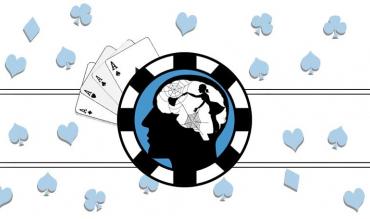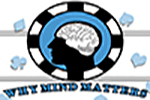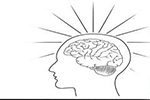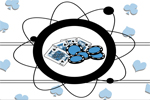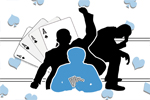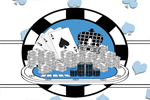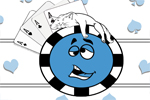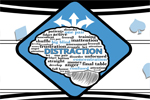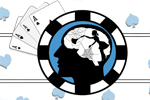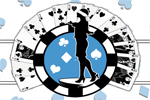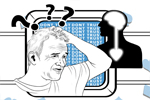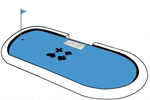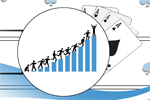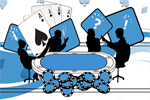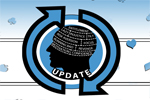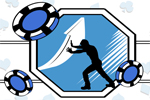Decluttering Your Mind
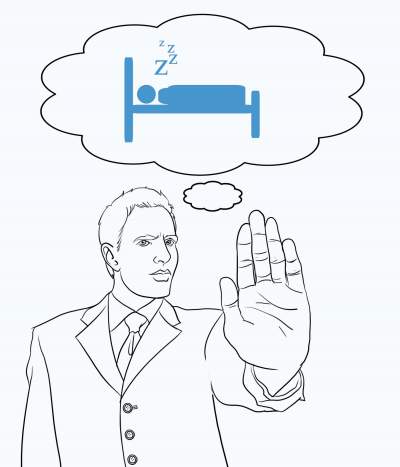
In the last chapter I discussed how focus is your tool for gathering the data you need to make quality decisions at the poker table. But what if you don’t have room in your mind to holdit?
Have you ever studied so hard or played so long that you reach a point where you simply can’t retain new information? Your head gets so full,things stop making sense. Not only is your brain overwhelmed, you have a hard time concentrating, miss key pieces of information and feel mentally exhausted like your head is in a fog. Eventually, you take a break to give your mind a chance to digest so that your ability to thinkclearly canreturn.
The cost of having too much data crammed into your head doesn’t have to be this severe to be a problem. It can cause three often subtle issues:
- Mistakes
- Difficulty sleeping
- Inability to play in the zone
Mistakes
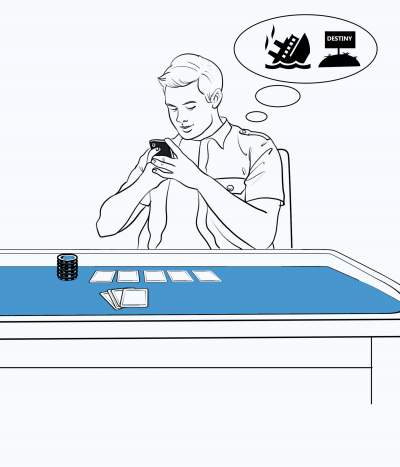
While playing, it becomes harder to absorb details of the action, think clearly and focus. Plus, finding things you have learned recently is hard.It’slike searching through a messy desk. You miss opportunities and make mistakes.You end up playing your B-game. Not the end of the world, butthe drop in your game is costing you, and your mind starts looking for a wayto recover. Ideally, you’d take a short break, but players often turn to their phone, Skype or social media instead. These distractions do the opposite and cause your game to rapidly spiral downwards.
Difficulty Sleeping
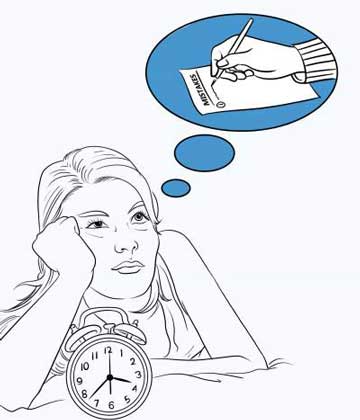
Two other problemsplayers often don’t associate with a cluttered mind is difficulty sleeping and an inability to reach the zone consistently. After a long day of playing you feel exhausted and desperately want to go to sleep. But the second your head hits the pillow,poker hands spontaneously pop into your mind and continue like a movie that won’t stop. This can go on for hours and eventually may lead you to stay awake watching a movie or browsing the internet. Or, if you can fall asleep right away, thoughts about hands wake you up before you get a full night’s sleep.
The brain has a natural process for digesting information and converting it into learning—much like the digestive system converts food into the nutrients that feed the body.Replaying hands or being awoken with thoughts is evidence of this data digestive system in action.
Players are often skeptical about this idea, and there’s a simple way to prove it. Rather than trying to go to sleep when your mind is full, write about what’s in your head. Note challenging hands, mistakes that you made and why they happened, details of your opponents play, or anything tactically or mentally that’s on your mind related to the game. Do it until you have nothing left to write about, or up to 30 minutes, and then try to go to sleep.You may not fall asleep without any thoughtsthe first time you try it, but try it for a week or two and you’ll be more likely to fall asleep and stay asleep.
Inability to Reach the Zone
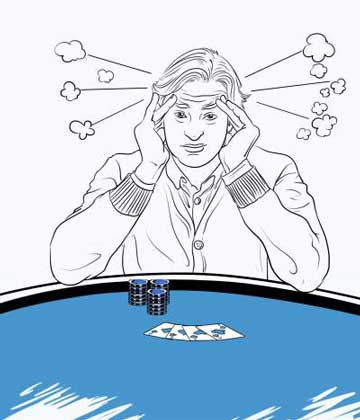
Accumulating too much data can also block your ability to get into the zone. Think for a moment how often you’re able to reach that mental peak where you make decisions easily, focus entirely on the action, and are in total command of your game. And don’t include those times when it seems like you’re in the zone when you’re just running hot. If you’re like most players I talk with, the answer is not that much—10% at most. There are many reasons players have difficulty reaching the zone, and a cluttered mind is one they don’t often think about. You need to be able to access new data to reach the zone. Without it, you can play at a high level, but you won’t be in the zone. This data fuels the ability to make correct decisions without fully understanding why they’re right. That high-level intuition is a hallmark feature of the zone, and when your mind is overloaded with data, there’s no room for it.
Clearing out your mind is something that happens automatically when you rest, but when there is so much data being absorbed, it can carry over day to day.This leads to a plateau where it becomes hard to play better than your B-game and learn new tactics. A cluttered mind is a hidden danger that is fairly easy to solve when you’re motivated to optimize your learning and performance.
Clearing Your Mind
You know what it feels like when your mind is sharp. Feeling fresh after a few days off, you return reenergized, focused, and thinking clearly. What if you could get your mind in this state more often, without having to take chunks of time off? The key is to develop a routine that accelerates the digestion of data. Here are some ideas how to do it:
- Write
- Rest
- Limit active learning
Write
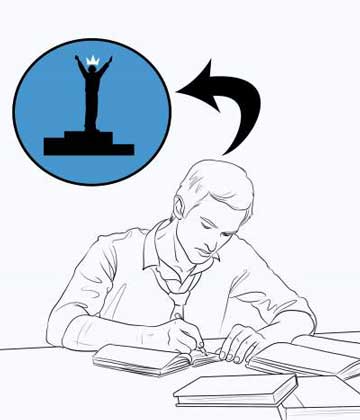
I already mentioned how writing can be used to declutter, and I now want to give you more details about this idea. To begin, just write.Don’t get bogged down in writing the correct thing. After your session or tournament, write down whatever is in your head. This could bethoughts about hands that you played poorly, opponents who confused you, why you played some tough spots well, and what caused you to be distracted. You can also use your writing to vent about intense emotions that popped-up, like tilt from mistakes you made, fear you had when making a big bluff, or a rush of excitement from making the final table.
There’s no right or wrong answer to what you write about.The first goal is to get the most pressing information or thoughts about the game out of your head. As you become more skilled, you’ll be able to direct your writing in a way that will help you improve tactically and mentally.
I regularly hear from players who were surprised how valuable it is to write after their sessions. It’s helped them separate poker from their life, so they rest easier and enjoy their personal time. That allows them to not only have more energy, motivation, and clarity for the next time they play, it helps them learn. Not in a dramatic way, but enough thatthey more regularly notice improvements.
Take Notes to Improve Your Game
You don’t even have to review what you write to see a benefit. The mental clarity you get from getting the data out of your head is valuable on its own. Howeverat a minimum, I recommend that you review a few of the key take-aways from your writing as part of your warm-up before the next time you play. This creates a cycle where you regularly focus on improving specific parts of your tactical and mental game before, during and after you play. That kind of repetition is key to accelerating improvement.
There is also long-term value in writing. Being able to look back to things you wrote about weeks or months later can give you a unique perspective on your game. If you get into a rut, reviewing old notes can give you insights on how to get your poker game back on track. Or, you may assume that your game hasn’t improved much lately, but your notes show that your thinking about the game has evolved.
One special note for tournament players who are competing in events for more than 10 hoursper day, over multiple days. Consider taking some quick notes during each of your breaks. I realize you don’t have much time, but even writing for one or two minutes can make a difference. Digesting data throughout the day can keep your mind clearer longer and make it easier to recover before another long day.
Rest
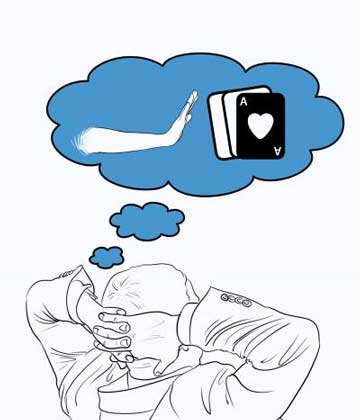
Time away from poker is not only important for recovering the energy you burn from playing, it’s helps digestthe datayou absorbed. Beyond getting proper sleep, if you play a lot of poker be sure to take time away from anything too mentally demanding. Often poker players do the opposite. They continue to tax their mind by reading poker forums, playing intense video games, or spending hours on the computer. During the season, a professional football player would never play two hours of tennis, for example, after an intense day of training. They would rest their body and perhaps use an ice bath, sauna, nap, or massage to accelerate their recovery. Playing poker is a good way for a footballer torelax, much like going for a run or playing tennis would be for a poker player.
There are so many personal factors to consider when attempting to devise an optimal strategy for rest, including how much poker is being played. So my advice is to think about:
- How much sleep you need to feel rested and how to get it more often
- Whether you need to take breaks throughout the day, and what to do during them
- What activities help you recover, such as exercise, eating, hanging out with friends, or watching TV
- How much time off from poker you need per week or month to avoid burnout
- What hobbies you enjoy that don’t drain you of mental energy
Players can have difficulty getting good rest or taking time off because they aren’t sure what’s optimal for them or what to do with their time. Thinkabout it beforehand, test some options and eventually you’ll find out what’s best for you.
Limit Active Learning
Right before you play poker is not the time to be filling your head with more knowledge than you can use. Playing poker isn’t like cramming for a test. Before you play poker, focus on reviewing hands or concepts that you already know, rather than learning something new. Watch a poker video that you’ve seen a few times, not a new one. Be clear on what you’re trying to improve each day, and reviewsome hands that fit with it.
The space in your mind is valuable real estate. Keep it clear and you’ll see a rise in your profit.
Jared Tendler, MS, LMHC is licensed therapist specializing in sport psychology and is the leading authority on the mental game in poker. Throughout his nearly 10 years coaching poker players he has worked with over 500 players hailing from over 45 countries, including many of the top players in the world. He is also the author of two best-selling books on the subject, The Mental Game of Poker 1 and Poker 2.
